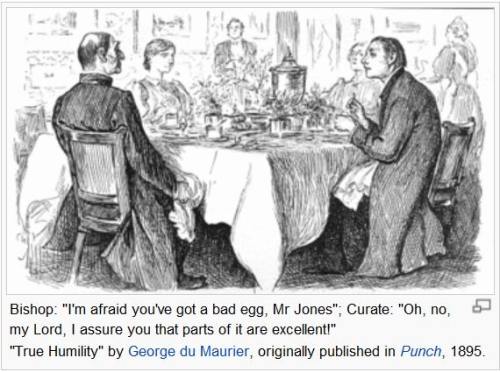I am indebted to Professor Peter M. Lee of the Mathematics Department of York University and to Stephen Goranson of Duke University for these extracts from York’s page on the I’net, which has a particularly good history of the expression “Lies, Damned Lies and Statistics”.
According to Google Book Search, Volume 11 (1886) of The Accountant, includes the following:
“. . . whereupon counsel on the other side was heard to explain to his client that there were three sorts of liars, the common or garden liar … the damnable liar who is fortunately rather a rara avis in decent society, and lastly the expert, …”
There was a query in Notes and Queries (7th Ser. xii) (1891 Oct. 10), p. 288, which seems to divert attention towards statistics:
DEGREES OF FALSEHOOD. – Who was it who said, “There are three degrees of falsehood: the first is a fib, the second is a lie, and then come statistics”? ST. SWITHIN
(According to Folklore 41 (3) (1930), 301 and 63 (1) (1952), 4–5, “St. Swithin” was a pseudonym used by Mrs Eliza Gutch (1840–1931), of Holgate Lodge, York.)
In Notes and Queries (7th Ser. xii) (1891 Nov. 21), p. 413, the following replies appeared:
DEGREES OF FALSEHOOD (7th S. xii. 288). – There used to be a somewhat better version of this saying current in Lincoln’s Inn years ago, of a judge who recognized three degrees in liars: the liar simple, the d—d liar, and the expert witness. The point lies in the fact that expert witnesses are allowed to give evidence as to what is their opinion, and hence are out of the reach of an indictment for perjury, which always hangs over the head of the ordinary witness, who can testify to fact only. To whom the saying was attributed I am sorry to say I forget—probably to any one whom it fitted. In those days it probably would have fitted Sir George Jessel. W.D. GAINSFORD.
There is another version of ST. SWITHIN’S query which, if he is not, as he probably is, acquainted with it, may be of interest to him, namely, the three degrees of liars, which are said to be the liar, the d—d liar, and the mining engineer. F.W.G.
In “Pie-Powder”: being dust from the Law Courts collected and recollected on the Western Circuit by A Circuit Tramp [John Anderson Foote], London: John Murray 1911, page 180 we read:
Baron Bramwell was another conspicuous personality on the Bench. He it was who invented the well-known classification of pervertors of the truth—“liars, d—d liars, and expert witnesses.”
This may be what is referred to in the following three quotations:
In “The Whole Duty of a Chemist,” an unsigned article in response to an address by Prof. Wm. Odling [1829–1921], Nature, Thursday, November 26, 1885, p.74 ‘A well-known lawyer, now a judge, once grouped witnesses into three classes: simple liars, damned liars, and experts.’
Newcastle Weekly Courant, Saturday 4 April 1891, p. 3, ‘A rather eminent lawyer has been kind enough to classify witnesses as three kinds: “liars, d—d liars, and experts. Truly it would be interesting to know how he divided the lawyers.”’
Pall Mall Gazette, Friday 12 August 1889, p. 7, ‘An eminent judge is said to have expressed his opinion of paid witnesses as follows:– “There are liars, and d—d liars, and experts.”’
Sir Robert Giffen (1837–1910) wrote as follows in 1892:–
An old jest runs to the effect that there are three kinds of comparison among liars. There are liars, there are outrageous liars, and there are scientific experts. This has lately been adapted to throw dirt upon statistics. There are three degrees of comparison, it is said, in lying. There are lies, there are outrageous lies, and there are statistics. Statisticians can afford to laugh at and profit by jokes at their expense.
A minute of the x Club, scientific friends of Thomas Henry Huxley (1825–1895), for December 5, 1885, reads “. . . Talked politics, scandal, and the three classes of witnesses—liars, d—d liars, and experts.”
According to Google Book Search, the Transactions of the Minnesota State Medical Association periodical included the following in 1892:
The statements were to the effect that there are three classes of unreliable witnesses, and they were respectively classified as the liar, the blanked liar and the medical expert.
According to Google Book Search there is a references on page 5 of the Travelers’ Record for 1891 to ‘ “the liar, the d–d liar, and the —” (expert witness, mining engineer, etc.)’ and on page 11 to ‘the liar simple, the d–d liar and the expert witness.’ (Stephen Goranson is recorded as saying that, although Google Books gives the date of this issue as 1891, the issue itself dates itself to 1892.)
I enjoyed greatly the article from which these extracts are taken. The full references are to be found at Lies, Damned Lies and Statistics on the York website.
There’s a serious point to all this, however. In something over 40 years as an arbitrator and adjudicator and, I might as well admit it, expert in the Court and in arbitration, one thing I learned was this: An expert may seem partisan, sometimes more partisan than Counsel or the client, and still be right. An expert may be precise in his or her objectivity and still wrong. A witness may be caught out in a lie, and yet may be correct in some material aspects of the evidence offered. The message for arbitrators and others is, I suggest, that relevant evidence should be analysed with care, whoever offers it. Having said that, with an expert arbitrator, who needs experts ? But that’s another topic!
The message for arbitrators and others is, I suggest, that relevant evidence should be analysed with care, whoever offers it. Having said that, with an expert arbitrator, who needs experts ? But that’s another topic!
